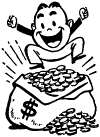The word known to all men.
Dear Word Detective: Today my son was reading and asked me if “moolah” was a French word. I was pretty sure it wasn’t, said so, and then scurried off in search of etymology on the internet, as is my wont. Imagine my surprise to find it listed as “Origin Unknown” by all respected authorities and, even more incredible, no investigation done by the esteemed Word Detective! Time to put on that fedora and hit the streets, gumshoe! Seriously, though, I know that if all the major dictionaries are saying it’s “Origin Unknown,” that means just what it says: nobody has a real answer yet. But perhaps you could fill us in on the leading theories on “moolah”? — Kyle Riff.
 Oh, ye of little faith! Of course I’ve researched “moolah.” And researched, and researched, poring over both hefty volumes of etymological wisdom and websites of flamboyant flapdoodle. I have researched until my fingers are cramped and my eyes are crossed, yet the journey always ends with me making another cup of coffee and picking a different question to answer. But people keep asking about “moolah,” so I guess you folks deserve at least a progress report.
Oh, ye of little faith! Of course I’ve researched “moolah.” And researched, and researched, poring over both hefty volumes of etymological wisdom and websites of flamboyant flapdoodle. I have researched until my fingers are cramped and my eyes are crossed, yet the journey always ends with me making another cup of coffee and picking a different question to answer. But people keep asking about “moolah,” so I guess you folks deserve at least a progress report.
What makes this quest especially frustrating is that “moolah” is one of my favorite words. As a vernacular synonym for “money” since the late 1930s, “moolah” has the swing and swagger of great slang and instantly brands its user as way too cool to sweat the small change of life.
One would think, with so many people wondering about the roots of “moolah,” that someone would have come up with at least one entertaining “urban legend” about the word, but no such luck. What theories do exist about its origins are both terse and far-fetched. One holds that “moolah” derives from the French “le moulin,” meaning “the mill,” referring to factory mills as a source of wealth. Color me extremely unconvinced. But while we’re stretching plausibility to the breaking point, I must mention the recent announcement, by the Times of India newspaper, that “moolah” is the Fijian (as in Fiji, in the South Pacific) word for “money.” Unfortunately, I lent my Fijian dictionary to my accountant last week, so I’ll have to wait until he gets back to check this assertion. But unless someone can explain how a Fijian word ended up on the lips of US gamblers and hipsters in the 1930s, I plan to ignore that theory. Yet another theory traces “moolah” to the Romany (Gypsy) word “mol,” meaning “to be worth,” which is not impossible but is considered unlikely by linguists.
Another theory, proposed by Daniel Cassidy in his recent book “The Secret Language of the Crossroads: How the Irish Invented Slang,” traces “moolah” to the Irish phrase “moll oir,” meaning “pile of gold.” My inclination is to consider this quite plausible, but Mr. Cassidy apparently paints with a very broad brush, also tracing “buckaroo” to the Irish “bocai rua” (wild boys). It has long been generally accepted, on solid evidence, that “buckaroo” is actually derived from the Mexican Spanish “vaquero,” meaning “cowboy.”
That doesn’t, of course, mean that Mr. Cassidy is wrong about “moll oir,” and personally I like his theory. But the quest must continue.




Quite possibly it simply derives from the Arabic word for money ??? – which is pronounced “Mellah”.
Don’t have to go that far. In Arabic, money is “mulla”.
Thinking of Cassidy’s proposal, this could actually make sense if you factor in the Mexican Vaqueros who attempt to say “Bucai Ruo” which might be what they thought the Irish settlers called them in English. This would sound like “Buckaroo”. Not saying it’s 100% but something to consider.
Further supporting my claim is the fact “Buckaroo” is an extremely popular Australian term with “wallaroo & Jackaroo” also being present. It makes more sense that the term comes from old Irish term and when Irish settlers were in the western expansion they interacted with Vaqueros (say it with an Irish brogue) and they would assume they were calling themselves “Bucai roo” as we interpret languages we don’t know using the sounds and rules of our own language.
Further to support imagine french/German/English/finish/and Irish settlers in the south gambling and the Irish says “don’t touch the moll oir” when referring to the gambling pot and how the others would interpret and use the term. Human interaction is the most important factor when we consider the origin of many terms (especially slang) because all languages borrow terms from one another.